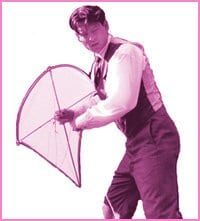Talk about an extreme makeover. In the new movie, Finding Neverland, closeted, troll-like author JM Barrie (Peter Pan) is played by het hottie Johnny Depp. It’s a transformation worthy of sci-fi or an online chatroom profile.
And, judging by the movie’s promotional materials, Barrie’s been straightened out, too. No more sexual confusion. No more self-loathing. Concentrating on the year leading up to the 1904 premiere of Peter Pan, the only gay thing that seems to remain is Barrie’s showbiz aspirations.
James Matthew Barrie was born in Scotland in 1860 (yes, Johnny Depp does the accent), the seventh of 10 children. His dashing brother David (Mom’s favourite) was killed in a skating accident in 1867 at the age of 13. That was as old as anyone should be, according to Barrie. “Nothing that happens after we are 12 matters very much,” he once said. “When I became a man,” Barrie noted sadly, “[David] was still a boy of 13.”
After graduating from Edinburgh University, Barrie was expected to work and marry. “Greatest horror,” he wrote in his notebook, “dream I am married-wake up shrieking.”
Defining genius as “the power to be a boy again at will,” Barrie churned out popular sentimental stories and plays about his mother, his childhood and-that’s right-boys.
Describing a character, he once noted: “Perhaps the curse of his life was that he never ‘had a woman.'”
With societal screws tightening, the 34-year-old Barrie entered into a sexless marriage. Didn’t his bride-an actress from one of his plays-read any of his stuff? “He was a boy only,” Barrie wrote of one autobiographical character. “And boys cannot love. Oh, is it not cruel to ask a boy to love?”
In 1897, Barrie finally met his true love: the Davies family. Arthur Davies, a successful lawyer, his wife Sylvia (Kate Winslet in the film) and their five perfect sons, George, Jack, Peter, Michael and Nico. And like the budding little girls who inspired Lewis Carroll’s Alice in Wonderland, Barrie dedicated Peter Pan, or the Boy Who Would Not Grow Up, to “the Five” Davies boys, saying that he “made Peter by rubbing the five of [them] violently together, as savages with two sticks produce a flame.”
When Arthur and Sylvia died of cancer in 1907 and 1910, respectively, Barrie became the boys’ principal guardian.
Barrie’s first favourite, George (“There never was a cockier boy… He strikes a hundred gallant poses in a day”), gave him Peter Pan’s line, “To die will be an awfully big adventure!”
As George grew up and then died in World War I, the “dark and dour and impenetrable” Michael became Barrie’s favourite-until he, too, grew up and fulfilled a suicide pact with another student at Oxford.
“On the whole,” wrote Barrie of a fictional version of Michael, “I think he is still partial to me… he so skillfully turned what began as a tear into a wink and gazed at me from the disappearing train with what I swear was a loving scowl… He no longer needs me, of course… and he will go on needing me less. When I think of [him] I know that those were the last days in which I was alive.”
Even Peter threw himself in front of a London subway train in 1960 (the newspaper headlines read “Peter Pan commits suicide”). Before he died, he described Barrie-who died himself in 1937-as a “strange little creature” whose “connection with our family brought so much more sorrow than happiness.”
Turning the frowns upside down, little of this darkness makes it into Finding Disneyla-, er, Finding Neverland. Instead, the movie seems to be a Shakespeare in Love-style dramady about how awww-worthy little kids and their hot single mom inspire a hunky, quirky artist.
Should we care that Hollywood gives Barrie a foot in height, a clean shave and cheekbones to kill for? Well, yes. Because that’s not who Barrie was. It’s like your family still telling the uncles and aunts that you’re straight. That marching for gay rights? Just a phase…
The real Barrie led a miserable life full of shame and secrets, but he put on the appearance that everything was fine and dandy-as most closeted gays had to do at the time and still do today. Disney executives could have finally told the truth and explored the costs of staying in the closet. But they didn’t. They kept Peter Pan in the closet.
FINDING NEVERLAND.
Opens in theatres Nov 12.

 Why you can trust Xtra
Why you can trust Xtra


